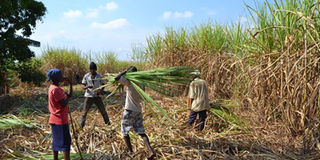Masindi farmers have sugarcane but no food

Harvest. Workers collect sugarcanes in one of the plantations in Masindi District last week. PHOTO BY MUDANGHA KOLYANGHA
What you need to know:
- A study commissioned by civil society in December last year revealed that the country is facing biting hunger and malnutrition.
- The report conducted by the Food Rights Alliance, Health Promotion and Social Development and Centre for Health Rights and Development showed that 10.9 million Ugandans experienced acute food insecurity between the months of March and November “and 1.6 million were in a food crisis situation”.
- The number was projected to double by end of 2018 if government did not prevail over the situation. Among the causes of this was climate change and poor farming methods.
Hunger has hit parts of Masindi District as farmers use land previously used to cultivate food crops for sugarcane growing.
The district speaker, Mr Moses Kirya, says there is a food shortage in Bwijanga, Budongo, Karujubu and Nyangahya sub-counties as many people opt to feed Kinyara Sugar Works with sugarcane.
Mr Kirya blames Kinyara and the production department for not observing and enforcing the district ordinance which was passed on June 23, last year requiring all sugarcane growers to use 10 per cent of their land for food crop production.
“It is the weakness of Kinyara and our production department for not observing the law,” Mr Kirya says.
The district production officer, Ms Prudence Alituha, says they cannot enforce the law stating that it is the role of the sub-county chiefs.
“As technical people, we participated in the developing of the ordinance and the enforcement is not ours,” Ms Alituha says.
Reason
The Masindi chief administrative officer, Mr Cristopher Okumu, says people have heavily invested in growing sugarcanes due to the desire to quick get money which is the cause of hunger.
“The problem is that even the poor who would ensure food crop farming hire out their land to sugarcane farmers,” he says.
He further says the enforcement of the Ordinance is still a challenge since most people may have not been consulted at the time of drafting the law.
“We can easily enforce the law if some people have complied, how can you enforce the law when majority of farmers have not complied,” he asks.
Mr Joseph Mugisa, a resident of Kinyara says they hire out their land to sugarcane farmers in search of money to take their children to school.
“We would plant food crops but those who hire our land give us a lot of money,” Mr Mugisa says.
The Bwijanga Sub-county councillor, Ms Mary Mujumura, says every family has suffered hunger due to poverty but there is hope for food since many people in the area have planted food crops now.
“We understand that there is hunger in our area but there is hope for food because people have planted food crops,” Ms Mujumura says.
Mr Job Byaruhanga, the Masindi agriculture officer, says they are aware of the food shortage in the district due to prioritising sugarcane growing.
“Our farmers are not observing the district ordinance to increase food production and we blame Kinyara Sugar Works for not guiding the farmers,” he says.
Mr Byaruhanga says cassava stems and banana suckers have been supplied to farmers in affected areas in a bid to increase food production and reduce hunger.
He says the district leadership should increase funding to enable them sensitise farmers on how to focus on food production.
Poor sensitisation
Mr Kenneth Nyendwoha, the Budongo Sub-county chairman, says the district ordinance is not being implemented in his area due to poor sensitisation of the people.
According to the Masindi production department and Environmental Management Ordinance 2017, every homestead in the district is required to have a granary and a sugarcane farmer is required to use 10 per cent of his or her land for food crops.
According to a survey carried out in 2013 by Makerere University School of Agricultural and Environmental Sciences in the sub-counties of Budongo, Bwijanga and Karujubu, among others, the sugar industry is important in the economy of Uganda as it provides employment and income to sugarcane out-growers and the employees in the industry.
According to a survey carried out in 2013 by Makerere University School of Agricultural and Environmental Sciences in the sub-counties of Budongo, Bwijanga and Karujubu, among others, the sugar industry is important in the economy of Uganda as it provides employment and income to sugarcane out-growers and the employees in the industry.



